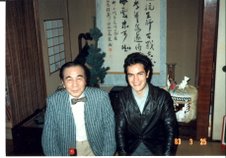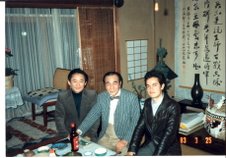Souvenir de Teoponte in Vienna
Souvenir de Teoponte in Vienna, December 2012
Following a joint initiative by the JS Bach Musikschule and IMEN a concert was arranged to take place on 7 December in the Festsaal at the Diplomatic Academy, Vienna.
IMEN (International Music Education Network) has been set up by the Director of the JS Bach Musikschule, Dr Hanns Stekel, in collaboration with a group of enlightened Viennese residents, seeking to provide opportunities for musical talent to flourish in places where access to musical education is limited. Right now IMEN has a presence in Bolivia , China, Chile, Costa Rica and Uruguay. The event in December 2012 was organised for the benefit of Instituto Laredo, my old school in Cochabamba.
Recently IMEN has scored a significant success: to secure a studentship to enable Andreas Siles, a hugely talented violinist from Instituto Laredo, to spend time in Vienna furthering his education. I had the chance to meet and to hear Andreas in my last couple of visits to Cochabamba, and was impressed by his talent, his determination and his warm, prepossessing personality. His situation reminds me of my own, forty or so years ago, having to wrench himself from hometown and family in order to pursue his musical vocation. I sympathise with his parents for the difficult decision they are having to make. But I know that Andreas will make the best use of this opportunity.
A period of study in Vienna for the wonderful flautist Daniela Moya is another possibility being discussed by IMEN, but this is less advanced and more funds will be needed than are currently available.
Back to my Viennese adventure. This benefit concert had been set as the occasion to première Souvenir de Teoponte for double bass and piano. Readers will remember that I wrote the piece last year, in response to an expression of interest from James Rapport, the double bass professor at the JS Bach Musikschule. The pianist for the première was Eduard Lanner, replacing Daniel Wnukovski who had had to withdraw from the project. In the event, it was difficult to imagine a better suited pianist than Eduard Lanner.
Messrs Rapport and Lanner had done serious work on Souvenir de Teoponte before my arrival. They allowed me to attend their final rehearsal, less than three hours before the concert, and even at this late stage they were receptive to comments and indications. It was clear that they are two seasoned professionals, neither of them a stranger to new music. The challenges the new piece was posing to them only highlighted, for the umpteenth time, the difficulties I create for myself and for my performers by composing the way I do. Yet again, I had tried to ensure the musical thoughts were stated simply and without frills. But, yet again, the result was characterised by technical, gestural and at times rhythmic intractability. I should despair, but I do not; I will continue to strive for greater simplicity - even if it is too late to help Messrs Rapport and Lanner.
On the night, the two performers fought like lions, and came up with a rendition that was committed, persuasive and characterful. That the piece spoke to its audience - and my well-trained success/failure meter told me unhesitantly it had - was in no small measure due to the impassioned delivery.
The concert was well organised and well attended. Fronting it with articulacy and aplomb was a young graduate from the Diplomatic Academy and member of IMEN, Jiao Tang. Solid groundwork - and very successful catering - was the work of Mathias Lichem.
The following morning a workshop took place at the JS Bach Musikschule. The small audience included students at the School and guests, in roughly equal numbers. The Bösendorfer Imperial provided a luxurious palette for Mr Lanner to depict the colours and textures. We had agreed to start and end the workshop with a full reading of the piece; in the event the players volunteered a third go, which proved the most faithful version.
It was pleasing to meet some of the students, among them a twelve-year old composer, Linus Köhring, who had just completed a new solo double-bass piece for James Rapport. A brief glance at the manuscript showed a sure hand and a working knowledge of the instrument. It transpired that the young composer is preparing his first opera, on a libretto by his older brother, aged fourteen, who was also in the audience. Something tells me that we will hear more about Linus Köhring.
Other interesting attendants at the workshop included Charlotte, a double-bass student, Maximiliano, a double-bass player from the south of Chile, the professional composer Michael Paulus, and Phillippe Ternes, a member of IMEN and conductor and founder of the choir at the Diplomatic Academy.
My hosts in Vienna were María Teresa Lichem, a highly respected literary critic and scholar, and her husband Walter Lichem, a former UN official and Austrian diplomat. They treated me with kindness and warmth, and lavished their valuable time on meals, and interesting conversation, delighting me with their inexhaustible knowledge of the city and its history. I cannot thank them enough for making my brief Viennese sojourn easy and enjoyable.
Mrs Lichem is, of course, one of the brains behind the project and the whole idea of IMEN. Another is Beatriz Bauer, a vivacious, dynamic operator whose ability to make things happen is legendary. At the heart of these interesting developments is the director of JS Bach Musikschule, Dr Hanns Stekel. He is energetic, knowledgeable, enthusiastic and possessed of a very original and creative mind. To meet them all was a joy and a privilege.
On this visit to Vienna, my first, it was important to make a pilgrimage to the sites connected with the idol of my youth, still the guiding light of my professional work. I was touched by the stark simplicity in which the Viennese preserve his Paqualati House by the Ring, and no less so the flat in Heiligenstadt. In both places admission is charged for what amounts to a very modest display of portraits and the odd document. In Heiligenstadt the richer exhibition was said to reside in the flat opposite, managed by a lady of a certain age who unfortunately was unwell on 8 December, so access was not possible. This arrangement seemed breathtakingly casual for the legacy of one of music’s towering figures. And yet my heart swelled at the sight and feel of these places where he had lived, breathed, walked and worked.
The brief pilgrimage ended at the cemetery, where I was able to salute the tomb of my immortal friend. I had forgotten that Schubert and Brahms were also buried within a few steps of the crucial spot. I gave them an affectionate greeting too, in what was by now a dark winter evening. My thanks to María Teresa and Beatriz for traversing the city with me on this composerly mission.
Two and half days were not enough for such a city, but I am very grateful for what it, and a few of its best residents, gave me.




